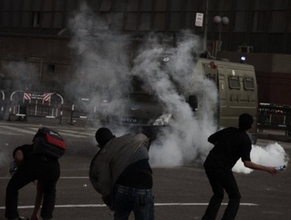|
World Jewish News

Photo by Al-Ahram
|
Egypt police forcefully disperse protesters after night of deadly clashes
26.01.2011, Israel and the World Egyptian police fired teargas and water cannons to disperse Egyptian protesters in Cairo in the early hours of Wednesday morning after a day of unprecedented protests inspired by the revolt that toppled Tunisia's president this month.
At least four people were killed in the clashes, three of which were demonstrators who were killed by police fire, and another was apparently a security official.
In the greatest show of force against Egyptian President Hosni Mubarak's 30-year reign, thousands of Egyptians took to the streets on Tuesday.
The United States urged all sides in Egypt to refrain from violence amid clashes between security forces and demonstrators as riots continued through the night, and said it wanted to see reforms to boost political and economic opportunity.
Secretary of State Hillary Clinton also said the United States believed the government of Egyptian President Hosni Mubarak, in power for three decades, was stable and was looking for ways to meet the Egyptian people's needs.
"The Egyptian government has an important opportunity to be responsive to the aspirations of the Egyptian people, and pursue political, economic and social reforms that can improve their lives and help Egypt prosper," the White House said.
"What is happening in the region reminds us that, as the President said in Cairo, we have an unyielding belief that all people yearn for certain things," the White House said, citing freedom of speech, a say in government, and the rule of law.
President Barack Obama spoke in Cairo in June 2009. The speech focused on his desire for a new beginning in relations between the United States and the Muslim world.
As the first Arab state to make peace with Israel, Egypt has much greater strategic importance to the United States than Tunisia. Cairo has long received significant U.S. aid and supported Washington's efforts to promote wider Israeli-Arab peace.
While former U.S. President George W. Bush at times strongly pressed Egypt to respect human rights and hold free and fair elections, his administration later softened its rhetoric and Obama has continued the softer tone.
Speaking to reporters, Clinton was measured in her comments about the protests in Cairo, where police fired teargas and used water cannon against protesters who shouted "Down, down, Hosni Mubarak" and hurled bottles and rocks.
"We support the fundamental right of expression and assembly for all people and we urge that all parties exercise restraint and refrain from violence," Clinton said in a comment addressed as much to the government as the protesters.
Partner of Egypt
State Department spokesman P.J. Crowley said the United States would continue to raise its concerns over the need for reform with governments in the region.
"The United States is a partner of Egypt and the Egyptian people in this process, which we believe should unfold in a peaceful atmosphere," he said in a statement.
Clinton said during a news conference with Spanish Foreign minister Trinidad Jimenez that Washington believed Mubarak's government was not in peril.
"Our assessment is that the Egyptian government is stable and is looking for ways to respond to the legitimate needs and interests of the Egyptian people," she said.
The revolt in Tunisia has thrown up questions about the stability of other Arab governments and initially dragged down equity, bond and foreign exchange prices in parts of the region, notably Egypt.
Tunisia's veteran strongman Zine al-Abedine Ben Ali was swept from power on Jan. 14 after weeks of protests. The United States was circumspect in its initial comments on Tunisia, but after dons of people were killed in clashes between protesters and security forces, Obama issued a statement to "condemn and deplore" the use of violence against peaceful protesters.
In his State of the Union speech on Tuesday, Obama said the United States stood with Tunisia, "where the will of the people proved more powerful than the writ of a dictator."
U.S. officials and analysts have suggested Washington is likely to tread lightly in using Tunisia's example to argue that other Arab regimes should open up.
Some officials said Arab rulers might draw the opposite lesson from Tunisia's unrest -- that they should crack down hard at the first sign of protests.
Haaretz.com
|
|
